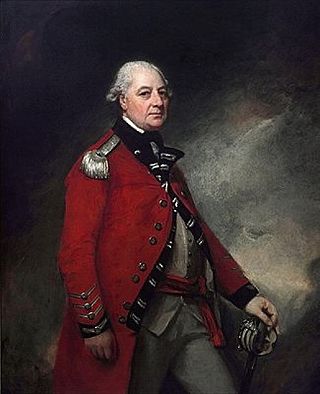
Earl of Kingston is a title in the Peerage of Ireland. It was created in 1768 for Edward King, 1st Viscount Kingston. The Earl holds the subsidiary titles Baron Kingston, of Rockingham in the County of Roscommon, Viscount Kingston, of Kingsborough in the County of Sligo, Baron Erris, of Boyle in the County of Roscommon, and Viscount Lorton, of Boyle in the County of Roscommon, also in the Peerage of Ireland. He is also a baronet in the Baronetage of Ireland. Between 1821 and 1869 the earls also held the title Baron Kingston, of Mitchelstown in the County of Cork, in the Peerage of the United Kingdom.

Field Marshal George Townshend, 1st Marquess Townshend, PC, known as The Viscount Townshend from 1764 to 1787, was a British soldier and politician. After serving at the Battle of Dettingen during the War of the Austrian Succession and the Battle of Culloden during the Jacobite Rising, Townshend took command of the British forces for the closing stages of the Battle of the Plains of Abraham during the Seven Years' War. He went on to be Lord Lieutenant of Ireland or Viceroy where he introduced measures aimed at increasing the size of Irish regiments, reducing corruption in Ireland and improving the Irish economy. In cooperation with Prime Minister North in London, he solidified governmental control over Ireland. He also served as Master-General of the Ordnance, first in the North Ministry and then in the Fox–North Coalition.
This is an incomplete list of people who have served as Lord Lieutenant of Somerset. Since 1714, all Lord Lieutenants have also been Custos Rotulorum of Somerset.
Edmund Boyle, 7th Earl of Cork and 7th Earl of Orrery was an Irish peer and Somerset landowner.

Sir Matthew White Ridley, 2nd Baronet, was a Northumbrian landowner and politician who sat in the House of Commons between 1768 and 1812.
The High Sheriff of Sligo was the British Crown's judicial representative in County Sligo, Ireland, from the 16th century until 1922, when the office was abolished in the new Free State and replaced by the office of Sligo County Sheriff. The sheriff had judicial, electoral, ceremonial and administrative functions and executed High Court Writs. In 1908, an Order in Council made the Lord-Lieutenant the Sovereign's prime representative in a county and reduced the High Sheriff's precedence. However the sheriff retained his responsibilities for the preservation of law and order in the county. The usual procedure for appointing the sheriff from 1660 onwards was that three persons were nominated at the beginning of each year from the county and the Lord Lieutenant then appointed his choice as High Sheriff for the remainder of the year. Often the other nominees were appointed as under-sheriffs. Sometimes a sheriff did not fulfil his entire term through death or other event and another sheriff was then appointed for the remainder of the year. The dates given hereunder are the dates of appointment. All addresses are in County Sligo unless stated otherwise.
The High Sheriff of County Cork was the Sovereign's judicial representative in County Cork. Initially an office for lifetime, assigned by the Sovereign, the High Sheriff became an annual appointment following the Provisions of Oxford in 1258. Besides his judicial importance, the sheriff had ceremonial and administrative functions and executed High Court Writs.

The Board of Ordnance in the Kingdom of Ireland (1542–1800) performed the equivalent duties of the British Board of Ordnance: supplying arms and munitions, overseeing the Royal Irish Artillery and the Irish Engineers, and maintaining the fortifications in the island.



